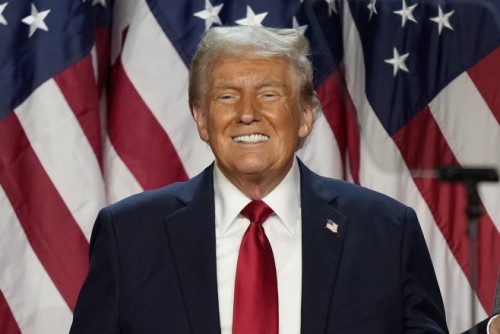 |
| Republican presidential nominee former President Donald Trump smiles at an election night watch party at the Palm Beach Convention Center on Nov. 6, 2024, in West Palm Beach, Florida./ Source: Yonhap |
Washington correspondent Ha Man-joo
Donald Trump was elected the 47th president of the United States on Wednesday, an extraordinary comeback for a former president after four years.
With a win in Wisconsin, Trump secured the 270 out of a total of 538 electoral votes needed to clinch the presidency against his Democratic rival, Kamala Harris, Fox News and The Hill reported on Wednesday.
Trump was ahead not only of electoral votes but also of the total number of votes cast. Trump had fallen behind not only in the 2020 presidential election that was defeated by President Joe Biden but also in the 2016 presidential election that was won by former Secretary of State Hillary Clinton.
In that sense, Trump won a landslide victory.
With his reelection, Trump now joins Grover Cleveland as only other person elected to a non-consecutive terms as president.
Vice President Harris’ defeat shattered her dream to become the first woman President of the U.S. and failed to match the achievement of African-American president Barack Obama.
The Republic Party secured 52 of the 100 Senate seats, reclaiming control of the upper house of Congress.
Also in the general election, Rep. Andy Kim, a third-term congressman, won a Senate seat for New Jersey, becoming the fist Korean American elected to the chamber. Korean American Reps. Young Kim, Michelle Park Steel, and Marilyn Strickland won the third term in the House of Representatives.
Trump’s victory can be said to be a judgment of the Biden-Harris administration’s state management over the past four years.
According to a survey of 115,000 U.S. voters conducted by the Associated Press (AP), the biggest interest of voters was the economy (39%) and immigration (20%), both of which are favorable to Trump.
Voters’ interest in abortion, medical health, and climate change, which was controversial by Harris, remained at 11%, 8%, and 7%, respectively.
When Trump takes office as president on January 20 next year, he is expected to speed up and force his campaign to cut corporate tax and energy prices, abolish regulations on oil and gas development, abolish the Inflation Reduction Act (IRA), build border barriers and remove undocumented immigrants from the country.
Besides, it is certain that the geopolitical landscape around the world will change significantly as Trump seeks to be a neo-isolationist based on his “America First” policy.
In particular, Trump is likely to link the reduction or withdrawal of U.S. troops from South Korea to renegotiate and significantly increase the cost-sharing agreement of U.S. troops in South Korea, and is expected to pursue denuclearization or non-proliferation negotiations with North Korean leader Kim Jong-un in any form.
#Donald Trump
Copyright by Asiatoday
Most Read
-
1
-
2
-
3
-
4
-
5
-
6
-
7





















